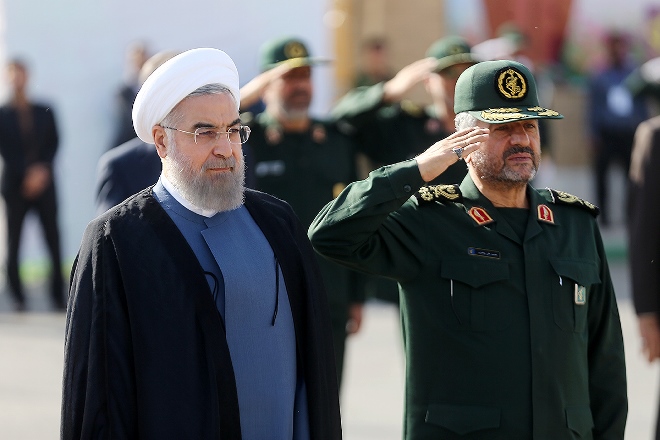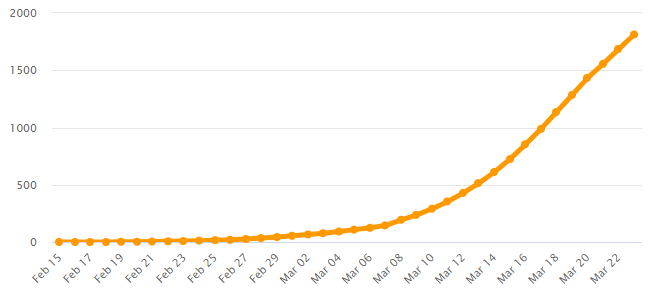Publications
INSS Insight No. 1280, March 26, 2020

Iran is going through one of the most severe depressions it has ever experienced – a function of the corona epidemic, the difficult economic situation due to sanctions, a fall in the price of oil, and a growing lack of trust on the part of the public toward the regime. Tehran is trying to use the pandemic to pressure the United States to lift the sanctions, or at least relax them, but the US administration has made it clear that it does not intend to do so, and in fact, recently imposed new sanctions. At the same time, the Shiite militias, apparently in coordination with Iran, continue to attack American forces stationed in Iraq, in an effort to hasten a US decision on withdrawal. The American response so far has amounted to attacks on militia bases in Iraq, but continued attacks, particularly if they result in American casualties, will lead to a stronger American response, even against Iran itself. On the nuclear issue, Iran has been accused by the IAEA of preventing access to sites where there is suspected nuclear activity in violation of the NPT. Regarding the renewal of talks with the United States that President Trump would like to see, it appears that Supreme Leader Ali Khamenei is actually more reluctant to return to talks from a position of weakness. In any event, it is hard to envisage any resumption of American-Iranian negotiations without a tangible gesture toward Tehran from Washington.
The coronavirus continues to hit Iran hard, including senior members of the regime, with Iran among the countries in the world with the greatest number of infections and deaths. An official in the World Health Organization estimates that the accurate figures for Iranian victims of the pandemic are five times higher than the reports. If this is correct, then Iran surpasses all other countries, with the highest number of victims. At this stage, it appears that the regime is not managing to enforce a lockdown on areas with multiple cases of infection, and has no plans to impose a general lockdown. This is partly for economic considerations, and also against a background of opposition from religious leaders and even parts of the public, who are not prepared to cooperate with such far-reaching moves.
At the same time, the regime has launched a broad campaign to try to force the United States to lift its sanctions on Iran. Tehran has asked the International Monetary Fund for an emergency loan of 5 billion dollars to help it deal with the corona crisis; President Hassan Rouhani sent letters to national leaders decrying the “cruelty of the American sanctions,” which he says damage his country’s ability to deal with the pandemic effectively; Foreign Minister Muhammad Zarif voiced sharp criticism of the mechanism used by Switzerland, with the approval of the United States, for Iran to acquire food and medicines, claiming that it is ineffective. In addition, the Iranian embassy in London has asked the British government to lift the sanctions, explaining the severity of their impact on the Iranian health system. A highlight of the diplomatic efforts was a moving and respectful open letter from President Rouhani to the American people. Sent on March 2, 2020 to mark Nowruz, the Iranian New Year, the letter noted the absence of borders in the spread of the virus, the need to cooperate in combatting it, and Iran’s strength and stamina in times of war – from the fight against Genghis Khan to the Iran-Iraq War. The climax of the letter was a direct appeal to the American people to pressure Congress and the administration to lift the sanctions.
(The open letter from President Rouhani to the American people)
The Iranian diplomatic campaign has reverberated in the international arena. The Chinese Foreign Minister called on the United States to remove all the sanctions on Iran. The Foreign Ministers of Britain and Iran held talks on a range of subjects, including the nuclear agreement and the sanctions, and London announced that it was possible to consider some relaxation of the sanctions. US Secretary of State Mike Pompeo responded to Iranian accusations in the open letter and clarified that there were no sanctions on humanitarian aid, which reaches Iran freely. He also stated that the Iranian regime had rejected offers of help from Washington through the World Health Organization. The American administration clarified that it had no intention of retreating from its policy of “maximum pressure,” and even announced a string of new sanctions against companies and individuals involved in the transfer of nuclear technology and trade in petrochemical products. At the same time, there are conflicting voices in Washington: some support a relaxation of sanctions, while others believe that the policy should not be changed, and that sanctions will eventually force Iran to change its policy and return to the negotiating table.
Against the background of the Iranian decision to release some 85,000 prisoners from jail because of the pandemic (of these, 10,000 have been pardoned), Pompeo called on the Iranian regime to release prisoners with dual nationality on humanitarian grounds (e.g. Iranian-American, or other). It appears that discussions on this matter are ongoing through the Swiss channel, which is the link between Iran and the United States, and which last December was the conduit for arranging a prisoner swap between Tehran and Washington. Pompeo even demanded that any country providing Iran with aid to deal with the epidemic should make it conditional on the release of prisoners with dual nationality. Since then there have been a number of events that could be interpreted as Iranian gestures towards Pompeo’s demand: a Reuters journalist with British and Iranian citizenship was released for two weeks due to fear of the coronavirus in jails; an American citizen with Lebanese citizenship, who was formerly a commander in the South Lebanon Army and was arrested about six months ago, was released and returned to the United States – a move the President Trump himself mentioned at a press conference; another American citizen, who was arrested two years ago in Iran and sentenced to 13 years in prison, was released on condition that he remain in Iran and is presently staying in the Swiss Embassy. France and Iran have also swapped prisoners. These steps can be viewed as Iranian gestures toward European countries as well as the United States, as part of the dialogue through the Swiss channel. However, it is doubtful whether they can pave the way to more extensive talks, in view of the new sanctions and explicit statements by the administration that it does not intend to relax them.
Meanwhile there appears to be growing military tension in Iraq between the pro-Iranian Shiite militias and the American forces on the ground. Although a Kata’ib Hezbollah Shiite militia based was attacked by American warplanes on March 13 in retaliation for the killing of two Americans and a British citizen, shooting continues around the American embassy in Baghdad. These, as well as statements by President Rouhani that there will be further revenge for the killing of Qasem Soleimani, reinforce the assessment that the militias are coordinating their moves with the regime in Tehran.

The agreement signed by the United States with the Taliban, whereby all American forces stationed in Afghanistan will gradually be withdrawn, encourages the thinking in Tehran that President Trump will implement his campaign promise to withdraw the US military presence in the Middle East. This assessment encourages Iran to continue to exert pressure on the American presence in Iraq, hoping to strengthen President Trump’s resolve to withdraw the troops. Indeed, the US has announced that it is making changes to its military presence in Iraq, in particular the evacuation of three small bases and the transfer of these troops to the large bases, where protection will be boosted by long and short range air defense systems. On March 19 the Americans handed the al-Qaim base over to the Iraqi army, and an army spokesman announced that “this is the first stage in the process of American forces leaving Iraq.”
While these moves spur the regime in Tehran and the Shiite militias to strive to accelerate the American withdrawal from Iraq, continued direct hits on American soldiers and citizens will force President Trump to respond – particularly as he grapples with the severe effects of the corona epidemic on the American economy (prior to the corona outbreak his economic achievements were a central card in his presidential election campaign). Secretary Pompeo has already said that the US sees Iran as responsible for the strikes, though in discussions about how to respond, the decision was reportedly taken not to act against Iran itself, for fear of creating a more negative image during the economic plight and health crisis.
As for the nuclear issue, Iran faces a significant challenge following the publication of an IAEA special report claiming that Iran has not responded to questions and has barred entry to two out of three sites suspected of containing unreported nuclear material. This allegation by the IAEA amounts to an Iranian breach of its obligations under the NPT. Iran has clarified that it will not allow any supervision and that it is not obliged to do so, as the accusations are based on “lies” – referring to information from the Iranian nuclear archive presented by Israel. Therefore, Iran could find itself in a scenario where the United States demands that the subject be brought before the Security Council, or even a renewal of sanctions, including those of the Security Council. However, at this stage it appears that both Iran and the United States are refraining from drastic moves.
In conclusion, Iranian conduct over the past few weeks has combined an attempt to use the spread of the coronavirus in its territory to press the United States to relax the sanctions, or at least to ensure that European countries do not join them, with attacks on American forces in Iraq. The assessment in Tehran is that President Trump is focused on corona problems at home, and will hesitate to cause further damage to Iran in its present vulnerable health predicament. However, if there is a breach of the delicate balance between further pressure on the Americans in Iraq and Trump’s need to keep his word over a response in the event of American casualties, there could well be a very severe American reaction.
Iran is now at one of the lowest points it has experienced. The extent of the corona virus alongside the serious economic consequences of the sanctions, which are made worse by the epidemic, combined with a drastic fall in the price of oil, means that the regime is facing one of its most severe challenges. In one sense, the pandemic is a kind of “shield” that protects the regime against the anger of the public that cannot go out and demonstrate, but the regime also understands it is hampered by the limited means at its disposal. The question of whether or not the current circumstances will bring Iran back to negotiations with the United States, which is what President Trump wants, is certainly high in the thoughts of the Iranian leadership. At present, the dominant position is that of Supreme Leader Ali Khamenei, whereby Iran must not come to negotiations from a position of weakness. In any event, it is hard to envisage any renewal of American-Iranian talks without a tangible gesture from Washington towards Iran.


